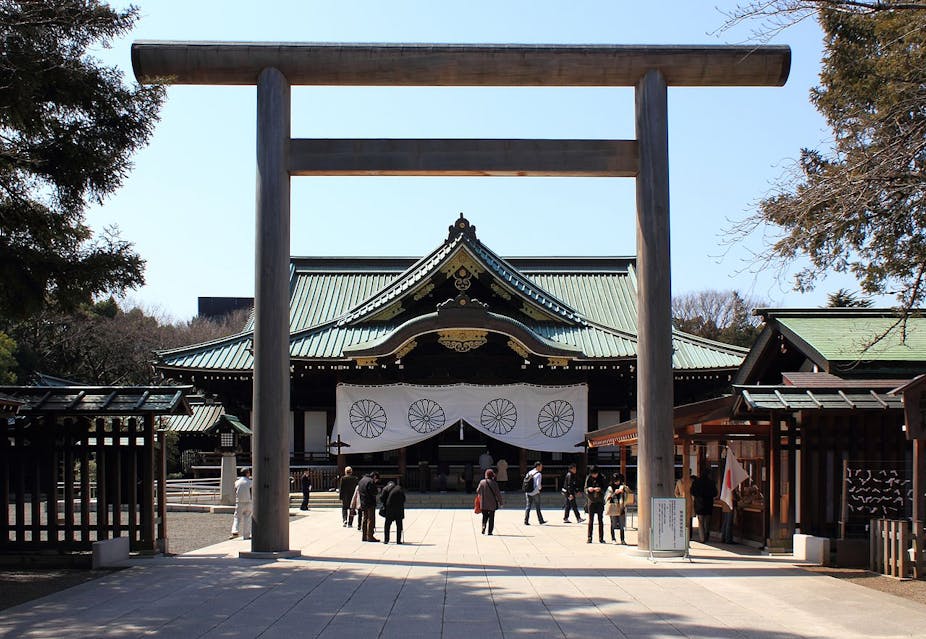The Yasukuni Shrine in Tokyo was built in 1869 at the very moment that the modern Japanese state emerged, and as Japan’s national war memorial it commemorates the souls of the 2.5m Japanese who have given their lives for their country. It is the equivalent in Japanese culture to the Cenotaph in Whitehall in London, at which Britain conducts its national ceremonies of remembrance.
But while the attendance of British politicians at the Cenotaph is expected, Japanese politicians’ visits to the Yasukuni Shrine are a cause of controversy. In fact Japanese leaders’ visits are carefully observed by Beijing and Seoul, and sometimes responded to with anger and resentment. Prime Minister Shinzo Abe’s visit in December 2013, for example, prompted a formal protest from the Chinese government condemning the act as glorifying Japanese militarism.
The issue here is that the shrine commemorates all the Japanese war dead, from every lowly private to the highest general – and this includes the 14 men classed as Class A war criminals following their trial and conviction by the Tokyo War Crimes Tribunal. While Britain and the Allies proudly remember their war dead and their triumph in the World Wars, mourning and remembrance is a more complicated matter for the defeated. In a culture also tarnished by the nature of the conflict, how can the war dead be remembered – especially in an official way – when they include those responsible for the Rape of Nanking, the sexual enslavement of so-called Korean “comfort women”, and for the torture of Allied prisoners of war?
Dealing with defeat is a challenge faced by other nations in the past. In France, following the loss of Alsace-Lorraine to the rising German Empire in 1870, defeat was explained as the last act of a decadent and corrupt empire. In its place would rise a better, stronger France. On the other hand, following the defeat of the Confederacy in the American Civil War, a powerful and attractive idea was created: the myth of the lost cause. This myth claimed that while the south’s fight to uphold states’ rights was noble and honourable, defeat was inevitable due to the superior economic power – but not moral courage – of the north. In these terms, the white south was able to mourn its dead and “accept” defeat (while glossing over the morally problematic causes of the conflict, foremost of which was slavery).
Another response to defeat as argued by historian Wolfgang Schivelbusch involves shifting cultural attention to something more palatable. The notable example is the US, which devoted significant energy in the 1980s to the celebration of the “good” war (World War II) to distract attention from its recent defeat in the “bad” war in Vietnam. These historical approaches are helpful in understanding the predicament facing contemporary Japan. But they only go so far towards providing a viable strategy. For that, we have to compare the experiences and reactions of Japan and Germany.
The consequences in Germany of President Ronald Reagan’s infamous 1985 visit to the military cemetery at Bitburg are particularly revealing. During a state visit to West Germany, an important US ally, Reagan toured the German war cemetery with Chancellor Helmut Khol, at the chancellor’s request. This was controversial because Reagan tried to justify the visit by arguing that those buried at Bitburg – including members of the Nazi Waffen-SS – were themselves “victims” of Nazism. What the controversy revealed, to Germans as much as to the Americans, was that some acts are beyond the political pale.

Lying uncomfortably with the past
Today, for all the contemporary resurgence of the neo-fascist right in Europe, mainstream German politicians do not attempt to rehabilitate the national war record. Ceremonies of remembrance do of course still take place at German war cemeteries, and there have been intense debates recently in Germany about how to remember those killed by Allied bombing raids. But these ceremonies and debates are accompanied elsewhere by important efforts to acknowledge the crimes perpetrated in Germany’s name. For example, the Berlin Memorial to the Murdered Jews of Europe (2005) and the Jewish Museum Berlin (2001).
It’s here that the comparison with Japan is revealing. Germany now remembers its 20th-century war dead, but use of the swastika is banned, holocaust denial is a crime, and federal money is available for memorials acknowledging German war crimes. In Japan, cabinet members and occasionally prime ministers visit the shrine and pay homage to the souls of the war dead, with journalists and photographers in tow. At the same time mainstream Japanese politicians have questioned the extent of the Rape of Nanking, or downplayed the enslavement of tens of thousands of the Chinese and Korean women. The textbook controversy, focusing on how Japan’s war record is interpreted in the school curriculum, has even seen the education system called into question.
Mourning and memorialising in the aftermath of military defeat is always problematic; mourning those who served a morally reprehensible and murderous political regime even more so. Germany has come far in responding to and moving on from its past through a careful programme of remembrance and reconciliation. It is to this example that Japanese politicians should look if the land of the rising sun is ever to truly come to terms with its legacy of war.

